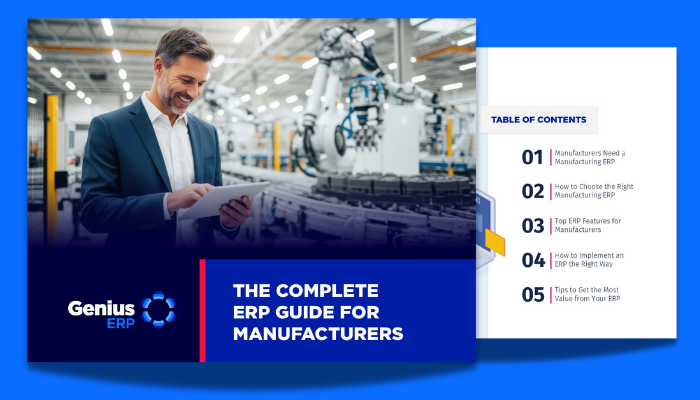
How to Properly Implement an ERP System
Want to learn the true secret to a successful ERP implementation? We asked one of our top ERP implementation experts to answer all of your burning questions.
Maxime Larose has helped guide over 50 companies successfully through the implementation process. Read on to find out all of his do’s and don’ts, plus Maxime’s number one tip for success.
How long should our ERP implementation timeline be?
The concise answer to this question is you should have a short implementation timeline — four to six months is the ideal timeframe for an ERP implementation project. Anything longer puts you at risk of not completing it.
The more nuanced answer is that you should do an ERP implementation project in phases. Pick your top priorities — ones that you can realistically accomplish in four to six months — and work on putting those features in place first.
A phased approach will ensure that you complete your implementation project — plus, it will give you a high ROI right from the get-go: You will not only have learned how to use your new system, but you also will have improved upon some of your biggest challenges.
After successfully putting those first few features in place, you can begin a second phase bringing more modules on board. It might take a bit longer to get your ERP up and running with this approach, but it is almost guaranteed that you will successfully finish your project – all the while continuing to improve your plant.
RELATED ARTICLE: The Fail-Proof Genius ERP Implementation Process
Our team comprises a great group of lead specialists (CFO, GM, VP of Engineering, etc.). Do we need to name just one person as project champion?
Ultimately, you need to pick one person to be your internal ERP project champion.
While it is crucial to have all key users and stakeholders on board and involved from the start, picking the right person to lead your project is a critical factor to a successful implementation.
Having a single project champion will improve communication both internally amongst your staff and externally with your ERP provider. Everyone will know who to go to for answers — and can rely on that answer to be the correct one.
Selecting a champion for a project as big as an ERP implementation isn’t easy. You need to choose a person with both the right technical skills and great communication and interpersonal skills. If you pick someone your staff doesn’t feel comfortable approaching with problems and issues, little hiccups might not get dealt with in a timely manner. These minor issues can quickly turn into major problems and potentially derail your entire project.
An internal champion will also be important long after the implementation process is complete, as it will give you someone who can internally oversee the system for you. Of course, you can always turn to your ERP provider with questions and issues after your implementation is finished, but your shop will run much smoother if you feel empowered and can tackle issues on your own.
Can we drop features and tools we do not need?
The resounding answer to this question is yes! When planning your ERP implementation, we highly recommend defining your pain points and major issues and tackling those priorities first.
When you move onto the second phase of your project, do the same thing: Identify your next biggest issues and implement those solutions. An ERP is meant to help your company become more streamlined and efficient. Even though they are overarching systems, ERPs are based on modules to give you the flexibility to build the system that is right for you. Don’t waste your time — ever — putting in parts of an ERP system that do not work for your business.
We are looking for a new ERP system because our last implementation project failed. What red flags should we be on the lookout for when assessing new ERP systems?
First, ask yourself, was it the system or the implementation process that let you down? If you feel that the system was good, but you failed during the implementation phase, you need to look at how any new potential ERP system handles implementation and training.
Some systems will be DIY — and that may work for you if you have the right resources on your team that can lead the entire process for you. This can be a great way for you to get a good ERP system at a great price, but you need to be honest with yourself: Can you really handle it all on your own?
Most ERP providers will have a training and implementation plan built into their processes (and cost). You must ask any potential vendor how they handle implementation and what their defined training processes are: What methods do they use? Is it flexible? How do they measure knowledge progression? Are you able to work through simulations in the system? Do external consultants and trainers handle it?
The last is an important question because external consultants and trainers may be very skilled at their work and can provide your staff with great training. But your implementation project will run into difficulties if it isn’t tailored to your shop and your needs.
It’s best if you can work directly with your ERP provider. As manufacturing experts, they can help you define your priorities. Then they can create a tailored plan and roadmap to ensure you get the right features put in place from the start. Only after this detailed roadmap is created should you start any training.
Our #1 ERP Implementation Tip
Implementing an ERP is hard. The good news is — if done right — it’s worth it. An ERP can genuinely transform your shop’s efficiency, reduce operational costs, and increase on-time deliveries. The number one tip that Maxime has for a successful ERP implementation is planning and perseverance. If you take time to plan out your implementation process and carefully plan what should be done first and what training you need, your project will be successful.
Perseverance is also vital, as your project will run into some problems and hiccups along the way — even with a carefully crafted plan. Remind yourself why you need an ERP system and push yourself through the tough spots to get where you need to go. The reward will come, but you need to be willing to take on the challenge.
Want to hear all of Maxime’s tips? Watch his webinar here.
2. Efficiently Manage Inventory
Effective inventory management is critical for custom manufacturers—use an ERP system to effortlessly and efficiently manage your inventory, ensuring seamless operations and improved productivity. With an ERP, you will avoid dreaded stock emergencies that result in insufficient raw materials to meet production demands.
An ERP system enables real-time tracking of inventory levels, automates replenishment processes and provides insights into material availability. This ensures that you maintain optimal stock levels, reduce excess inventory and avoid shortages, ultimately improving cash flow and customer satisfaction by keeping your shop running at maximum efficiency.
3. Effectively Manage Your Supply Chain
You rely on your partners and vendors to supply you with the right type and amount of materials at the right time to keep your production line moving. A robust ERP system optimizes supply chain management for custom manufacturers by automating your workflows and streamlining your processes, helping you to effectively manage complex supply chain networks.
With an ERP, you can collaborate seamlessly with suppliers, track shipments and manage procurement processes efficiently. You will improve relationships with your suppliers and partners, and information will flow seamlessly throughout your organization, making the procurement of goods easier and quicker. By ensuring timely availability of materials and reducing supply chain disruptions, you will improve operational efficiency and maintain a competitive edge.
4. Control Costs
Controlling costs is vital for small- to mid-sized manufacturers to remain competitive in today’s marketplace: An ERP system gives you comprehensive cost-tracking capabilities, allowing you to monitor expenses across different departments and projects. With an ERP, you can oversee costs throughout the entire production process to identify areas for potential cost savings.
You can analyze labor, material and overhead costs, enabling better decision-making and cost-reduction strategies. Real-time data, plus historical records, allow you to comprehensively analyze costs and identify which of your jobs are truly profitable.
5. Integrate Your CAD System
Integrating your CAD software with a manufacturing-specific ERP system allows you to seamlessly transfer design data to your ERP platform, eliminating manual data entry and reducing errors. CAD (Computer-Aided Design) software is essential for creating accurate and detailed product designs. With seamless CAD integration, you will optimize your design-to-production workflows to improve shop performance and efficiency.
CAD integration enables better collaboration between design and production teams, streamlines the quoting and estimating process and enhances overall efficiency in product development. Real-time synchronization between your CAD and ERP systems ensures that accurate product information flows seamlessly through the entire manufacturing process, resulting in improved productivity, reduced lead times and enhanced customer satisfaction.
RELATED ARTICLE: Get Seamless CAD Integration with Genius CAD2BOM
6. Integrate Your CRM
Your customer relationships are one of your most important business assets. Ensuring customer satisfaction is essential as it cultivates repeat business and generates valuable referrals. An ERP system equipped with integrated CRM (Customer Relationship Management) functionalities allows you to better manage and nurture customer relationships to foster customer loyalty.
A CRM connected to your ERP streamlines your customer support and makes your business more efficient, enables you to offer more fair and consistent pricing and helps you manage sales opportunities. Track customer interactions and streamline the entire sales cycle with an integrated CRM to improve service levels. By accessing customer data, preferences, and order history in one place, you can provide personalized service and build strong long-term relationships.
7. Use Real-Time Data Analytics for Better Decision-Making
An ERP system provides valuable insights through real-time data analytics—letting you make better decisions that drive your business forward. ERPs equipped with robust data analytics and business intelligence (BI) features give you the tools to assess and improve your operations, streamline your processes and increase efficiency and profitability.
With an ERP, you can generate reports, monitor key performance indicators (KPIs) and gain actionable insights into various aspects of your business. This empowers you to make informed decisions, identify trends and seize opportunities for continuous improvement. When used in tandem, ERPs and BI improve your business’s agility, give you complete visibility and oversight into your operations and pave the way to business success.
8. Grow Your Business
As a small- to mid-sized custom manufacturer, your goal is growth. An ERP system is designed to scale alongside your business, accommodating increased orders, expanding product lines and entering new markets. Investing in an ERP will let you take complete control and integrate all your departments into one system. You will streamline business processes and enable easy sharing and collaboration between your departments. An ERP will reduce the cost and complexity of managing your business and make you a leaner and more efficient organization, poised to handle new challenges and take on more business.
With an ERP, you can leverage your data not just to give you a snapshot of where your business is at, but also to create a strong strategic direction for your company. An ERP provides a foundation for sustained growth, allowing you to seize opportunities without worrying about outgrowing your current systems.
Conclusion
Small- to mid-sized custom manufacturers can greatly benefit from implementing an ERP system. From optimized production planning to real-time analytics, an ERP system is invaluable in driving operational efficiency and fostering growth. By investing in an ERP solution and unlocking your company’s full potential, you can position yourself for success in today’s dynamic marketplace.
Request a demo today to see how Genius ERP can drive your business forward.
Get your eBook Scared to implement a new ERP?
"*" indicates required fields



